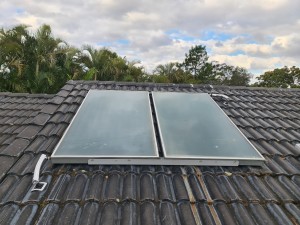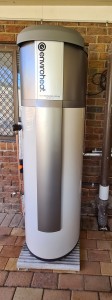Solar hot water and heat pumps are both energy-efficient options, but their efficiency can depend on location, climate, energy costs, installation, and household needs. Here’s how they compare:
Solar Hot Water Systems:
- Efficiency: Solar hot water systems can be extremely efficient as they use energy from the sun to heat water, making them very efficient in sunny climates with high solar exposure. They typically have higher energy efficiency during warm months and can reduce or eliminate water heating costs. Efficiency can be up to 85%, depending on the availability of sunlight and panel location.
- Climate Impact: Solar systems are highly efficient in sunny areas but may need backup (electric or gas) systems in regions with inconsistent sunlight or during cloudy days.
- Operating Costs: Once installed, solar hot water systems have very low operating costs since they primarily rely on free sunlight.
- Maintenance: They generally require a major service every 4-6 years, but occasional cleaning and inspections of the panels and pumps are necessary and to ensure optimal performance, longevity, and energy efficiency.
- Environmental Impact: Solar hot water systems have a low carbon footprint since they utilise renewable solar energy.
- Best For: Homes in sunny climates where the system can operate efficiently year-round with minimal backup heating.
- Limitations: Will require a backup heating system for rainy or overcast days.
Heat Pump Hot Water Systems:
- Efficiency: Heat pumps are highly efficient since they use electricity to transfer heat from the air, usually less energy than traditional electric water heaters. Efficiency can be put to 73%
- Climate Impact: They are most efficient in moderate to warm climates but can also work well in colder weather. Whilst highly efficient, heat pumps rely on electricity to run. Pairing with solar PV panels can offset electricity costs.
- Operating Costs: Heat pumps can have minimal operating costs due to their electricity consumption but still provide significant savings compared to traditional electric or gas heaters.
- Maintenance: They generally require a major service every 4-6 years but occasional inspection of the system is required to ensure its optimal performance, longevity and energy efficiency.
- Environmental Impact: Heat pumps can have a lower environmental impact compared to fossil fuel systems, especially if powered by renewable electricity sources.
- Best For: Homes in mild climates, or areas without consistent sunlight, where solar hot water systems might be less reliable, or where roof space is not available.
- Limitations: System must be installed outside for optimal performance.
Which is More Efficient?
- Solar hot water systems are generally more efficient in sunny regions, as they use free, renewable energy from the sun.
- Heat pumps are more versatile and can be more efficient in areas with less sunlight, as they do not depend on solar energy.
Conclusion:
- In sunny, warm climates: Solar hot water systems are likely the more efficient and cost-effective option, with lower ongoing costs.
- In cooler or cloudier climates: Heat pumps may be more reliable and efficient due to their ability to work in various weather conditions.
Choosing the most efficient option depends on your location, energy costs, available incentives, and personal preferences. Contact King Solar Man on 0416 075 682 or visit https://www.kingsolarman.com.au/systems/for further advice.


